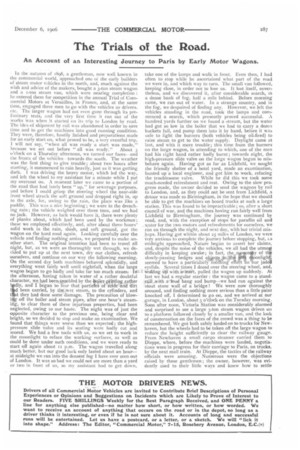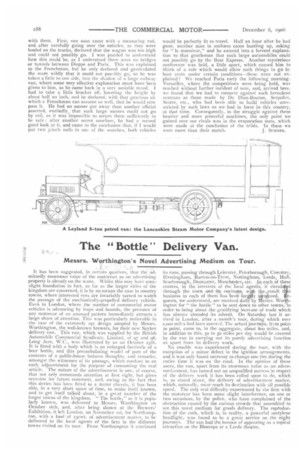The Trials of the Road.
Page 5

Page 6

If you've noticed an error in this article please click here to report it so we can fix it.
An Account of an Interesting Journey to Paris by Early Motor Wagons.
In the autumn of 1898, a gentleman, now well known in the commercial world, approached one of the early builders of steam motor vehicles in the north, and, much against the wish and advice of the makers, bought a 3-ton steam wagcm and a mon steam van, which were nearing completion : he entered them for competition in the annual Trial of Commercial Motors at Versailles, in France, and, at the same time, engaged three men to go with the vehicles as drivers, etc. The larger wagon had not even gone through its preliminary tests, and the very first time it ran out of the works was when it started on its trip to London by road. The idea of shipnient by rail was abandoned in order to save time and to get the machines into good running condition. They were, therefore, hastily finished and preparations made for an early start on, what proved to be, a very eventful trip. I will not say, "when all was ready a start was made." because we set out before " all was ready." About 3 o'clock on a Thursday afternoon, we turned our facesand the fronts of the vehiclestowards the south. The weather was the first thing to give trouble; about two hours after starting, it commenced to rain heavily, just as it was getting dark. I was driving the heavy motor, which led the way, and left the wheel to my assistant for a minute while I put my overcoat on. A moment later we came to a portion of the road that had lately been " up," for sewerage purposes, and before I could grasp the steering wheel the near-side front wheel struck the soft ground and dropped right in, up to the axle, for, owing to the rain, the place was like a puddle. This was a nice beginning ; we were in the drenching rain ; the vehicle weighed over three tons, and we had no jack. However, as luck would have it, there were plenty of planks about, which had been used by the workmen; these we employed effectively, and, after about three hours' solid work in the rain, slush, and soft ground, got the wagon on the hard road again. Looking carefully over the vehicle and finding nothing amiss, we prepared to make another start. The original intention had been to travel all night, but, as we were so thoroughly wet through, we decided to put up at the next town, dry our clothes, refresh ourselves, and continue on our way the following morning. On the second day both machines behaved splendidly, and everything went fairly well until nightfall, when the large wagon began to go badly and take far too much steam: the afternoon, having taken in water of a rather doubtful character, we had beetkbIed by the boiler primiacrather
dly, and I began to Tear that -particles of settle :and dirt d been carried, by ileitAvet steam, to the cylinders, and
t they had done some'damage. The precaution of blow offthe boiler and steam pipes, after one hour's steaming, to clear them of these injurious properties, had been neglected, owing to our haste. The night was of just the opposite character to the previous one, being clear and bright, so we decided to stop and make an examination. We found that things were worse than we expected ; the highpressure slide valve and its seating were badly cut and scored. We had a few tools with us, so we set to work in the moonlight to reface the working surfaces, as well as could be done under such conditions, and we were ready to start off again about it p.m. The wagon travelled along much better, but our good luck only lasted about an hour— at midnight we ran into the densest fog I have ever seen out of London. It was so bad we could not see more than a yard or two in front of us, so my assistant had to get down,
take one of the lamps and walk in front. Even then, I had often to stop while he ascertained what part of the road we were in, and which way to turn. The small van followed, keeping close, in order not to lose us. It lost itself, neveer, theless, and we discovered it, after considerable search, in a dense bank of fog, half a mile behind. Before morning came, we ran out of water. In a strange country, and in the fog, we despaired of finding any. However, we left the vehicles standing in the road, took the lamps and commenced a search, which presently proved successful. A hundred yards further on we found a stream, but the water had got so low in the boiler that we had to carry a dozen buckets full, and pump them into it by hand, before it was safe to light the burners (both vehicles being oil-fired) to raise steam to get to the water. supply. Daylight came at last, and with it more trouble ; this time from the burners on the large wagon, in attending to which, one of the men had his light hand rather badly burnt ; towards night, the high-pressure slide valve on the large wagon began to misbehave again. Having got as far as Lichfield, we sought the friendly shelter of a hotel yard, made an examination, hunted up a local engineer, and got him to work, refacing
the troublesome valve. While he did this we took some much-needed refreshment and rest. Owing to the slow progress made, the owner decided to send the wagons by rail to London, and, as they could not be sent from Lichfield, a detour was made to Birmingham, in the hope that we should be able to get the machines on board trucks at such a large station. This was found to be impracticable; so, after a short council of war, and the machines having run fairly well from Lichfield to Birmingham, the journey was continued by road, and, with the exception of stops for paraffin oil and water for the two motors and refreshments for ourselves, we ran on through the night, and next day, with but trivial mishaps. Having got within about 25 miles of London, we were very anxious to complete the journey before stopping, but, t.s midnight approached, Nature began to assert her claims, and, despite the noise of the vehicles, we all had the utmo difficulty in keeping awake; in fact, the., t y of t slowly-passing hedges and o4ct5,..inht sonligh
seemed to have a particularly soothing elf t n our jad eyelids. Several times I dozed over the steering wheel, and, \vatting 0with er■taft, pulled the wagon up suddenly. At last we had a regular startler : the wagon came to a standstill with a loud bang and bump—we had run against the stout stone wall of a bridge l We were now thoroughly aroused, and finding nothing more serious than a little paint knocked off, I determined to go on, and we arrived at our garage, in London, about 3 o'clock on the Tuesday morning. Soon after noon, Victoria Station was considerably alarmed and surprised to see a large 3-ton steam wagon driven on to a platform followed closely by a smaller van, and the look of consternation on the faces of the crowd was a thing to be remembered. We got both safely loaded on to trucks for Newhaven, but the wheels had to be taken off the large wagon to reduce the height sufficiently to clear the railway gauge. From Newhaven a small cargo steamer carried them to Dieppe, where, before the machines were landed, negotiations were in progress for their carriage to Paris, on trucks, by the next mail train. At Dieppe, the tactics of the railway officials were amusing. Numerous were the objections raised by these gentlemen; the owner, however, was evidently used to their little ways and knew how to settle
with them. First, one man came with a measuring rod, and after carefully going over the vehicles, as they were loaded on the trucks, declared that the wagon was too high and could not possibly go. I was puzzled to understand how this could be, as I understood there were no bridges or tunnels between Dieppe and Paris. This was explained to the Frenchman, but he only declared and gesticulated the more wildly that it could not posibly go, so he was taken a little to one side, into the shadow of i large railway van, where some very effective explanation must have been given to him, as he came back in a very amiable mood. I had to take a little bracket off, lowering the height by about half an inch, and he declared, with that gracious ail which a Frenchman can assume so well, that he would now pass it. He had no sooner got away than another official asserted, excitedly, that such large motors could not go by rail, as it was impossible to secure them sufficiently to be safe : after another secret conclave, he had a second good look at it, and came to the coeclusion that, if I would put two 3-inch nails in one of the scotches, both vehicles would be perfectly fit to travel. Half an hour after he had gone, another man in uniform came bustling up, asking for " le monsieur," and he entered into a fervent explanation to that gentleman that such large automobiles could not possibly go by the Boat Express. Another mysterious conference was held, a little apart, which caused him to :think of a rule which would allow such things to go by boat train under certain conditions—these were not ex plained We reached Paris early the following morning. Versailles, where the competitions were being held, was reached without further incident of note, and, arrived here, we found that we had to compete against such herculean veterans as those made by De Dion-Bouton, Serpollet, Scotte, etc., who had been. able to build vehicles unrestricted by such laws as we had in force in. this country, at that time. Consequently, in the struggle against these heavier and more powerful machines, the only point we gained over our rivals was in the evaporation tests, which were made at the conclusion of the trials, In these we were more than their match. J. SUMNER.




























